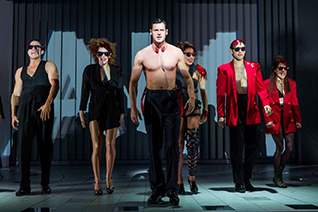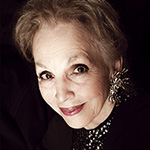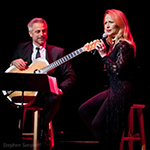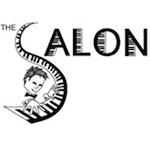American Psycho
The Musical
Gerald Schoenfeld Theatre, NYC, April 25, 2016
Reviewed by Elizabeth Ahlfors for Cabaret Scenes

Photo: Jeremy Daniel
You may not like hanging with this bloody bunch, but American Psycho has already scored twice, as Bret Easton Ellis’ 1991 novel and a 2000 film. Now with Duncan Sheik’s music, spot-on ’80s choreography by Lynne Page, and all-around spectacular staging, American Psycho: The Musical adds another chilling layer. You will definitely not overlook the talents or the brawn of Benjamin Walker as Patrick Bateman, self-absorbed American investment banker by day and possibly a serial murderer by night.
Based on Ellis’ novel, Bateman’s Wall Street world is a consumer culture centered around hardbody fitness, designer fashion, hot clubs and restaurants du jour where those who can get reservations are higher up the yuppie ladder.
Flash equals style for Bateman and his narcissistic posse, and the epitome is his wearing a suit custom made by Alan Flusser. “Flash your smile, bare your teeth. They’ll never guess what’s underneath.” But inside the suit is only his egocentricity, and who needs substance anyway?
In this world, it’s about making deals and Bateman’s mentor is Donald Trump and the textbook, The Art of the Deal. In Bateman’s final song, “This Is Not an Exit,” he admits his extreme self-absorption: “I am all alone here. I am the solipsist.”
Roberto Aguirre-Sacasa’s adaptation includes infusions of dark humor. The 1989 New York milieu is galvanized by a synth pop score by Tony winner Duncan Sheik (Spring Awakening) with ’80s songs from the film. The catchy opener, “Selling Out,” puts it out there with the repetitive reminder, “You bought it all.” Directed by Rupert Goold, sharp robotic movements on and off Tunnel’s dance floor recall the dances of the era while underscoring the feel of anxiety. Bateman’s references to knives and axes, his draw to real-life serial killers and his escalating tension, all hint at violence. Yet “Killing Time” does not come until the middle of Act One when he realizes “It’s the end of the world and none of it matters,” and a homeless man is the first victim. Later, as Huey Lewis and the News’ hit “Hip to Be Square” blasts the eardrums, Bateman smashes his guest’s head in a theatrical bloodbath that closes Act One.
Benjamin Walker (Bloody Bloody Andrew Jackson) has imposing vocal talent with acting ability that conveys Bateman’s psyche. Looking like a Ken doll, he captures Bateman’s inner cut-throat assassin. As his high-strung, demanding girlfriend, Evelyn, Heléne Yorke (Bullets over Broadway) hits the spot with broad perfection as does Morgan Weed as her bestie, Courtney. Tony Award winner Alice Ripley (Next to Normal) is under-utilized in several small roles. Jennifer Damiano (Next to Normal) is Jean, Bateman’s secretary who harbors a secret love for her boss and, although she’s a doormat, she’s is the only likeable character. Drew Moerlein, Jordan Dean and Theo Stockman are dapper as Bateman’s Wall Street cohorts.
All the elements of extravagance ring back to the ’80s: Es Devlin’s minimalist black and white sets, the garish lighting by Justin Townsend with Finn Ross’s videos and Dan Moses Schreier’s sound effects. Totally awesome are Katrina Lindsay’s costumes with women’s shoulder pads, the beginning rise of stilettos and men’s narrow ties. Campbell Young Associates topped the boss look with crimped hair.
This is a show that offers no likeable character (except Jean) and the nihilistic ending is remote, but then again, so is the lead character. Bateman is brought to stage life by Benjamin Walker, while American Psycho recalls the vibe of the era with satirical staging that thrills with style if not bone-chilling terror.





